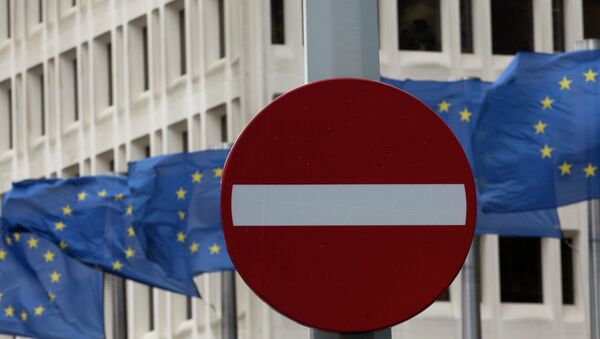In 2002, 70 percent of Italians believed that the EU had brought benefits to Italy; now, just 20 percent agree with that idea.
Enzo Risso, a professor of sociology and analyst for the market research firm SWG, told Sputnik Italy that there has been a collapse in confidence in the EU, because of its failure to deal adequately with a range of political and economic issues.
"There has been a change in attitude, from a Europe that was considered beneficial, towards a 'stepmother' which failed to cope with the changes taking place and keep its promises," Risso said.
Risso said that the Brexit referendum vote in the UK June 23, in which 52 percent of British citizens voted to leave the EU, was well received by a large portion of the Italian electorate, which would like to see Italy do the same.
"Thirty percent of Italians think that England did well, these citizens want Italy to do the same. It must be said, however, that the majority of Italians don't want to leave Europe."
According to opinion polls, a narrow majority of 52 percent of Italians favor remaining in the EU, despite the union's failings.
"We can see that the EU has made several mistakes. Europe was represented by the idea of fast development, a society that would guarantee the balance between growth and the welfare of the people. In this aspect, it has failed."
"Another failure is the way that European leaders handled the crises of sovereign debt and immigration. The ruling class has proven inadequate and unable to deal with the great issues of today," Risso said.
In traditional Italian politics, the Left is pro-European, Risso said. However, the growth of Italy's Eurosceptic Five Star Movement, which rejects the traditional politics of Left and Right, illustrates that people are looking for a new alternative.
The Five Star Movement is an anti-establishment party which was founded in 2009 by comedian and blogger Beppe Grillo and entrepreneur Gianroberto Casaleggio in the aftermath of the global financial crisis.
It bills itself as an anti-establishment, anti-corruption party, and its five stars relate to its five key issues: public water, sustainable development, sustainable transport, right to internet access and environmentalism. Its leaders want Italy to ditch the Euro single currency.
"The Five Star Movement is a new phenomenon, which is basically anti-European, we can say its instincts are anti-European. The anti-European front has expanded during this period," Risso said.
Risso said that in order to survive, the EU has to adapt to new challenges.
"To have a future, Europe needs to transform itself. There needs to be adequate and responsible leadership at the EU level, and national governments need to move away from narrow local interests and take into account global, political challenges," the researcher said.






